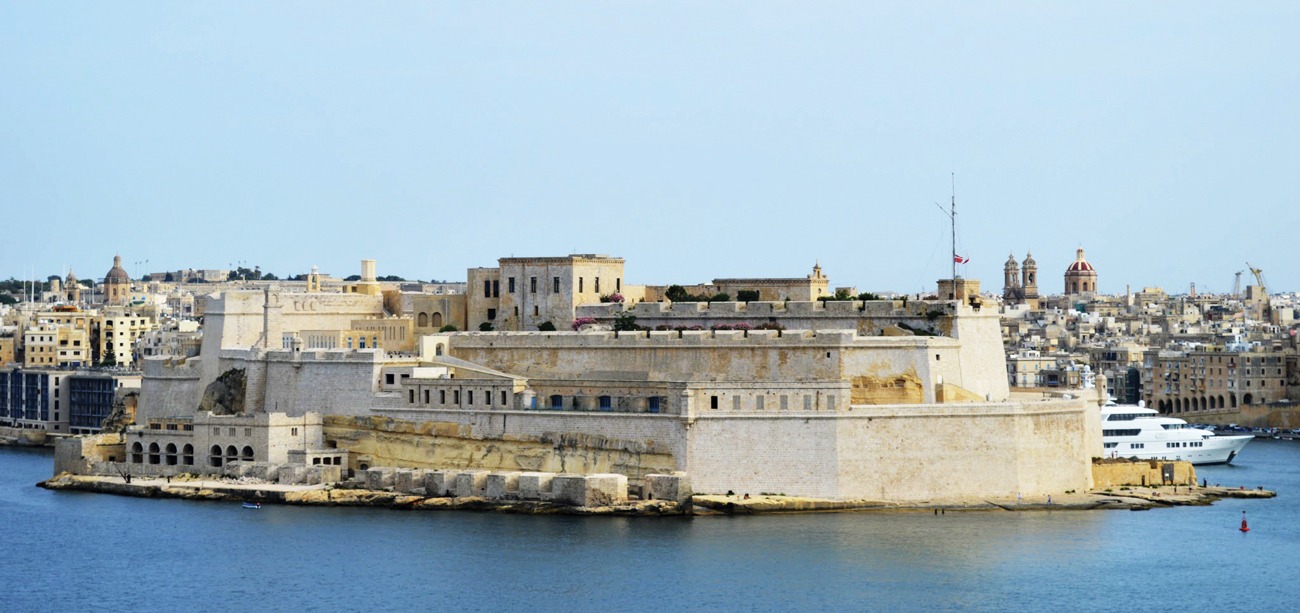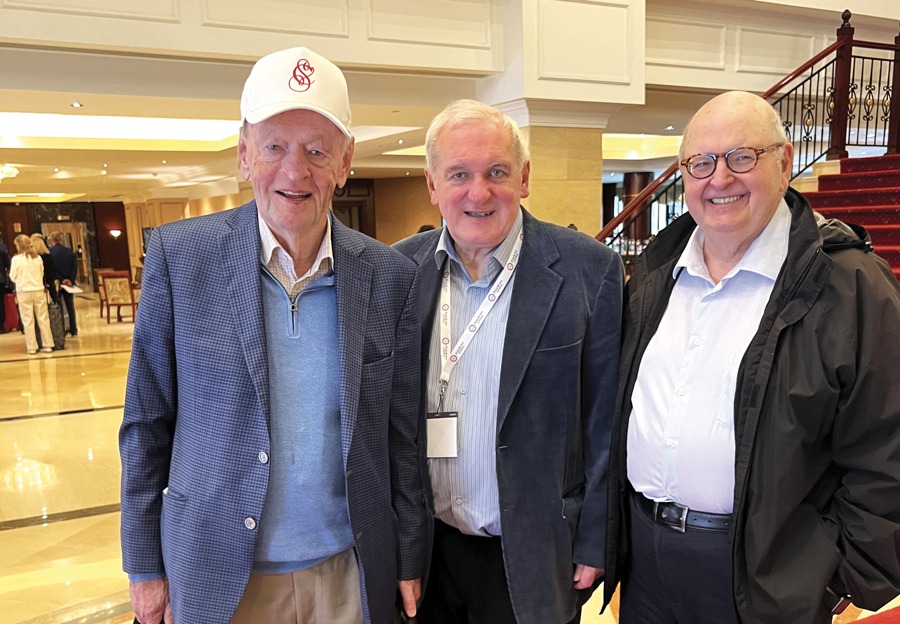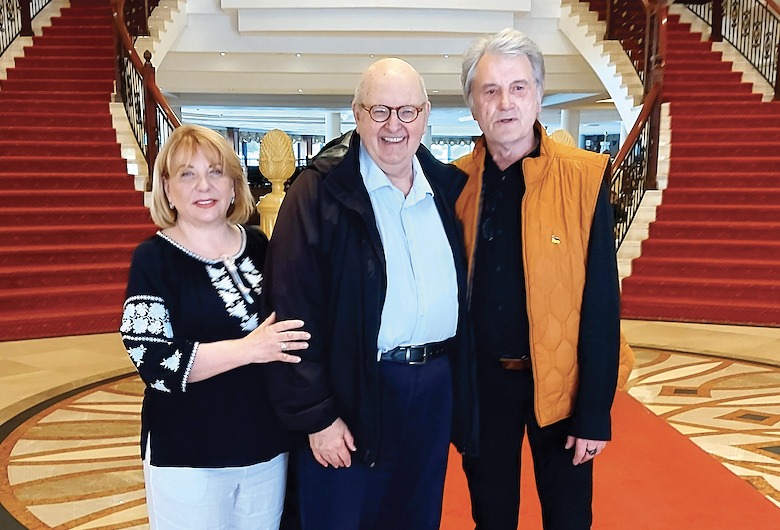War, Peace and a Canadian Knight: With the InterAction Council on Malta

Thomas S. Axworthy
June 26, 2023
The InterAction Council of Former Heads of State and Government was founded in 1983 to mobilize the energy, experience and networks of former world leaders to help solve the political, economic and social problems confronting humanity.
The Council is currently co-chaired by former Irish Prime Minister Bertie Ahern and former Nigerian President Olusegun Obasanjo. Former Canadian Prime Minister Jean Chrétien is honorary co-chair. I have been Secretary-General since 2011. Meeting annually, this year the Council accepted the invitation of former Maltese Prime Minister Lawrence Gonzi to hold the May plenary on the tiny archipelago (Malta’s islands have a population of half a million, less than my hometown of Winnipeg).
My father rarely discussed his service in the Canadian army but he was in the first Allied wave that liberated Sicily from the Fascists in 1943, and I do remember him telling me about the importance of Malta to the war effort in the Mediterranean. Malta endured over 3000 bombing raids by Hitler’s Luftwaffe and Mussolini’s Regia Aeronautica, making Malta a symbol of never giving up, however long the odds. In 1942, King George VI awarded the George Cross to the nation as a whole for their heroism (a replica of the cross is part of the design for the modern flag of Malta). Upon arriving in Malta, the first thing I did was to tour the Roman catacombs, where the Maltese sheltered from Hitler’s bombs, to see how they survived, and ultimately triumphed over tyranny. It is a lesson worth remembering as Ukraine today is now suffering the same kind of brutality for standing up to a dictator.
So, Malta was an appropriate setting for the InterAction Council to take up the themes of war, security, and humanitarian assistance. Dr. Samuel Johnson once told his friend and biographer, James Boswell, that “the grand object of travelling is to see the shores of the Mediterranean.” And Malta is at the center of that Sea.

Malta is an ancient place with preserved megalithic temples built 5,000 years ago, making them the oldest freestanding structures on earth; older than the pyramids or Stonehenge. It has been at the centre of Mediterranean trade and geopolitics since recorded history began, with the Phoenicians, Greeks, Carthaginians, Romans, Vandals, Arabs, Normans, Spanish and British all ruling the island (it finally became independent in 1964 and remains a Commonwealth country). It is steeped in myth and history: Odysseus spent seven years with the nymph Calypso on the island of Gozo; St. Paul was shipwrecked on its shores in 60 A.D. (and used the opportunity to convert the Roman governor); and the Ottomans were repulsed in the Great Siege of 1565. After its valiant resistance in World War Two, Malta became more widely known as the home of the future Queen Elizabeth and Prince Philip, where they spent what the Queen later recalled as the most “normal” years of their marriage, living as a young naval couple from 1949-51. In popular culture, Dashiell Hammett’s 1930 novel The Maltese Falcon and the 1941 film noir classic starring Humphrey Bogart are based on the true story of the annual duty paid of one live falcon by the Knights of Malta to the monarchs of Sicily for their granting of the island.
But the most well-known legacy of Maltese history is the Catholic order of the Knights of St John, more commonly known as the Knights of Malta, the oldest humanitarian organization in the world.
During the InterAction Council meetings, which opened in San Anton Palace, the 17th-century Order of St. John villa that now serves as the official residence of the president of Malta, we were hosted by current Maltese President George Vella. President Vella not only delivered an excellent address on the contemporary problems of the Mediterranean region, but also told us about the history of different palaces and lodges of the Grand Masters of the Knights of Malta. Established nearly 1,000 years ago, in 1048, to provide hospitals and protection for pilgrims to the Holy Land, (it was known then as the Knights Hospitallers) the Order has been headquartered in Malta since 1530. Today, its membership includes 13,500 knights and dames, it employs more than 50,000 professional staff and is served by 100,000 volunteers who manage hospitals and give care around the world. One of its most active missions is in Ukraine. Of special interest to both the Canadians at our meetings and to Policy readers; On May 3, the Knights of Malta elected their 81st Grand Master and first from the Americas, Canadian lawyer John Dunlap.
Whatever the specific issue before the InterAction Council in Malta this year — energy supply, food security, the role of diplomacy — the topics inevitably linked back to what was happening in Ukraine. Roberta Metsola — the Maltese-born president of the European Parliament, also emphasized Ukraine in her keynote address to the Council. Canadians live in a state of blessed and blissful security where no one really fears invasion or war. Not so in Europe today: it was a revelation to hear from leaders from Bulgaria, Latvia and a host of other European countries about their deep and urgent fear that war might soon be on their doorsteps.

The nexus of security, nuclear weapons and international guarantees was the first issue discussed at the plenary, and here the experience of Ukraine is instructive. At the dissolution of the Soviet Union in 1991, as a residue of Soviet weapons installations, Ukraine had the third largest nuclear arsenal in the world, with more than 1700 nuclear warheads — more than China, France and the United Kingdom. The world’s focus then was on how to dispose of these terrible weapons, and in 1994, Ukraine voluntarily denuclearized and joined the Treaty on the Non-Proliferation of Nuclear Weapons (NPT). This relinquishment of its arsenal was made in exchange for security guarantees by the United States, Russia and the United Kingdom in the Budapest Memorandum on Security Assurances, which states, “The Russian Federation, the United Kingdom of Great Britain and Northern Ireland, and the United States reaffirmed their commitment … to respect the independence and sovereignty of the existing borders of Ukraine.” Today, those existing borders have been invaded by one of the states that signed that guarantee.
Putin’s failure to respect international agreements led to much soul-searching by the leaders gathered in Malta about how to reform our international institutions, especially the United Nations. The InterAction Council issued the Malta Declaration on 10 actions to rebuild trust in multilateralism.
One of the areas was the safety of the Zaporizhzhia nuclear power plant in Ukraine, where civilians were evacuated in early May following the International Atomic Energy Agency (IAEA) warning of a possible “severe nuclear accident”. The Council called on the UN Security Council (UNSC) to deploy a UN/IAEA observer corps around the plant to prevent interference with its proper management. The call by the InterAction Council for the UNSC to take action on nuclear safety raises the issue of the operation of the Security Council, perhaps the most conspicuous example of an institution no longer fit for purpose.
“Among all the words and resolutions about war and peace, the moment seared in my memory from this meeting was the eloquent warning of former Ukrainian President Viktor Yushchenko, still bearing the scars from the dioxin poisoning that failed to pre-empt his victory in the 2004 election, that if Ukraine does not stop Russia now, other countries will be at risk.”
If the UNSC cannot or will not take up an issue, the Malta Declaration recommends that the issue be immediately placed before the General Assembly for action. Grand corruption and money laundering is another issue that our current governance institutions have been slow to take action on. The InterAction Council strongly urges the creation of a new Anti- Corruption World Court and the use of Russia’s more than $700 billion in frozen assets held in Western banks to be repurposed in the rebuilding of Ukraine.
But among all the words and resolutions about war and peace, the moment seared in my memory from this meeting was the eloquent warning of former Ukrainian President Viktor Yushchenko, still bearing the scars from the dioxin poisoning that failed to pre-empt his victory in the 2004 election, that if Ukraine does not stop Russia now, other countries will be at risk. His speech reminded me of Emperor Haile Selassie’s plea to the League of Nations in 1936 after the Fascist invasion of Ethiopia: “It is us today. It will be you tomorrow”.
The motto of the Knights of Malta, as a longstanding order of the Roman Catholic church, is “Tuitio Fidei et Obsequium Pauperum” — Defence of the Faith and Assistance to the Poor. While keeping the faith in multilateralism to better serve humankind applies equally to the leaders of the InterAction Council, this war in Europe is certainly testing that faith.
Contributing Writer Thomas S. Axworthy is Secretary General of the InterAction Council and Public Policy Chair at Massey College, University of Toronto.
